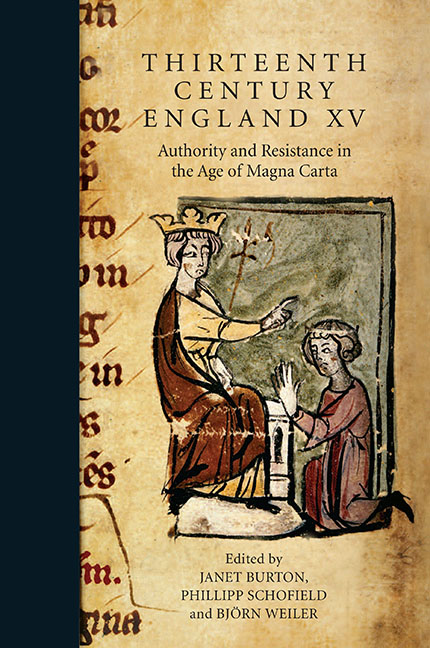 Thirteenth Century England XV
Thirteenth Century England XV Published online by Cambridge University Press: 11 June 2021
But because it was the Lord said to us through the Prophet [Jeremiah 1:9–10], ‘I have set you above peoples and kingdoms to tear up and destroy, build and plant’, and likewise elsewhere [Isaiah 58:6], ‘Dissolve bonds of impiety, undo the oppressive ties’, we refuse to ignore such malign audacity, contemptuous of the Apostolic See, damaging to royal rights, dishonourable to the people of England and a grave danger to the whole business of the Cross, which would be assuredly imminent lest all those things be revoked by our authority which have been extorted in this manner from so great a prince who has taken the cross, even though he wishes them to be upheld.
So Innocent III on 24 August 1215 quashing the baronial rebels’ ‘malign audacity’ in concluding the Runnymede charter with King John. This letter, Etsi karissimus in, sets out very clearly Innocent's view of the damage risked and repelled.
In many ways, it has been rightly argued, there is nothing to explain in Innocent's retort to the barons’ questioning of John's royal authority. Innocent's attitude was ‘predictable and consistent with his office’. His rejection of the barons’ and Prince Louis's attacks on John is indeed explicable given the pope's desire for a united crusade to recover the Holy Land, and John's taking of the cross on 4 March 1215. A better informed or less crusade-driven pope might well have judged differently. But contemporaries credited the possibility of papal opposition to John in 1215 more than the explicability of Innocent's position may allow. They believed papal opposition to John feasible; and had vouched for its existence when it came to rumours of a papal deposition of the king in winter 1212–1213. An October 1213 letter from the Irish barons supporting John indicates they thought Innocent was on the brink of absolving subjects of their fidelity. Innocent indeed proved implacable faced with John's opposition to Langton's confirmation at Canterbury. He did threaten John's ruinam, deposition. Even after offering terms Innocent licensed Langton to disinherit the whole Plantagenet line if John slid back. A ‘reserve’ letter (Expectantes hactenus expectavimus, c. March ? 1213) probably granted deposition. And Innocent was a pope perfectly capable of licensing resistence to ordained powers, as his interactions with Raimund VI of Toulouse, Sverre of Norway or Otto IV indicate.
To save this book to your Kindle, first ensure [email protected] is added to your Approved Personal Document E-mail List under your Personal Document Settings on the Manage Your Content and Devices page of your Amazon account. Then enter the ‘name’ part of your Kindle email address below. Find out more about saving to your Kindle.
Note you can select to save to either the @free.kindle.com or @kindle.com variations. ‘@free.kindle.com’ emails are free but can only be saved to your device when it is connected to wi-fi. ‘@kindle.com’ emails can be delivered even when you are not connected to wi-fi, but note that service fees apply.
Find out more about the Kindle Personal Document Service.
To save content items to your account, please confirm that you agree to abide by our usage policies. If this is the first time you use this feature, you will be asked to authorise Cambridge Core to connect with your account. Find out more about saving content to Dropbox.
To save content items to your account, please confirm that you agree to abide by our usage policies. If this is the first time you use this feature, you will be asked to authorise Cambridge Core to connect with your account. Find out more about saving content to Google Drive.